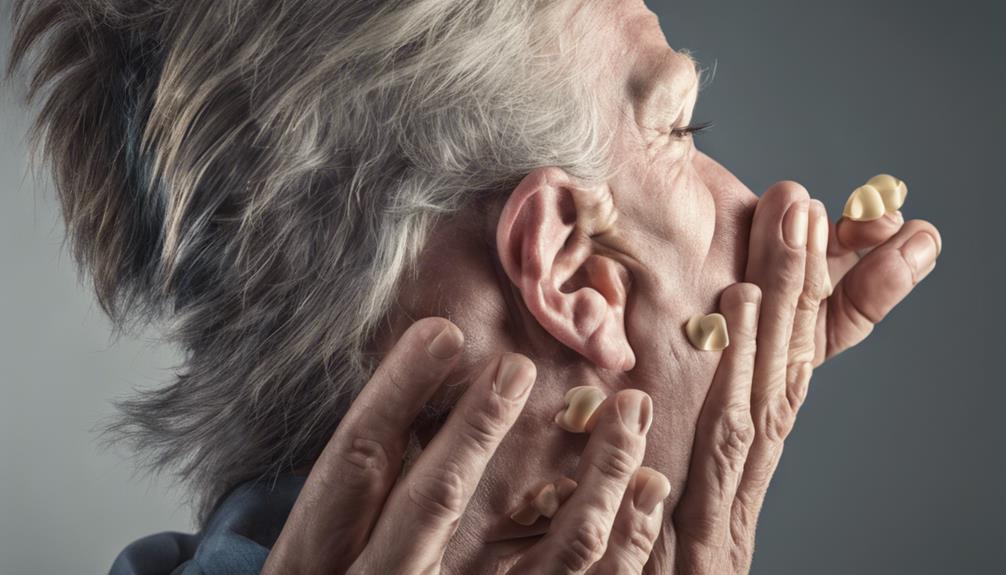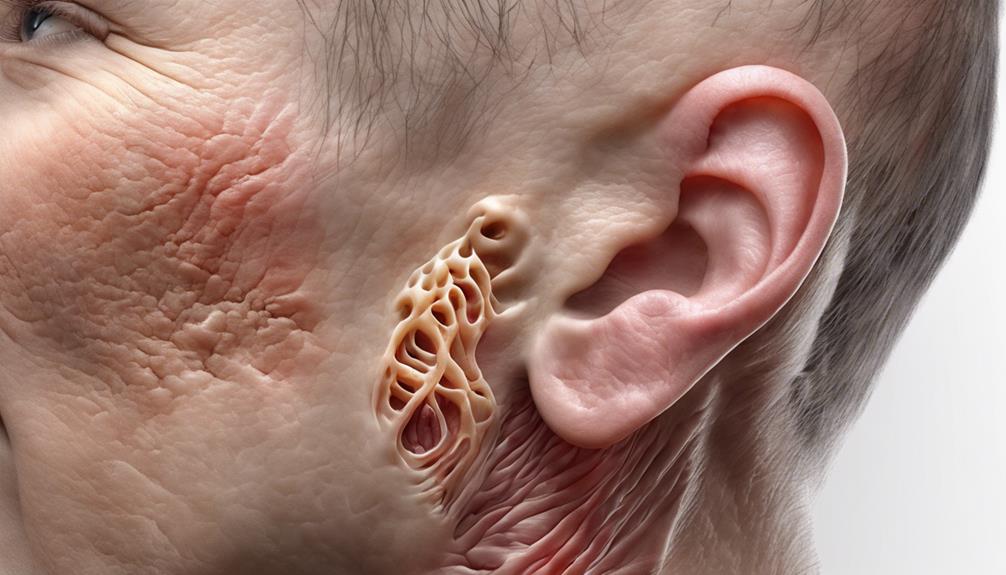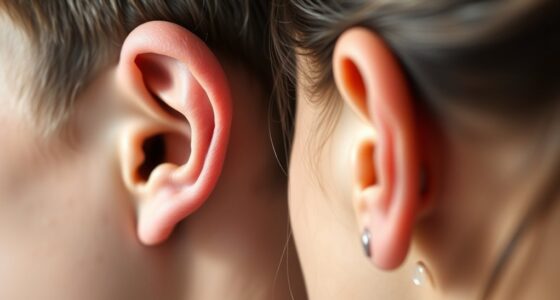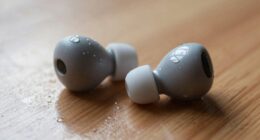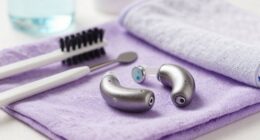Exploring the complexities of COVID-19 and its potential impact on hearing is akin to unraveling a challenging puzzle. The subtle yet important implications of this virus on our auditory system raise critical questions that must be explored.
By shedding light on the mechanisms through which COVID-19 may lead to permanent hearing loss, this guide offers a crucial starting point for those seeking to safeguard their hearing health in the face of an evolving health landscape.
Key Takeaways
- COVID-19 triggers inflammation damaging crucial auditory nerves.
- Immediate medical attention can prevent permanent hearing loss.
- Understanding symptoms and seeking early treatment are vital.
- Long-term monitoring and lifestyle adjustments help manage COVID-related hearing issues.
COVID-19 and Permanent Hearing Loss
Contracting COVID-19 can result in permanent hearing loss due to damage to the nerves involved in hearing. When the virus enters the body, it can trigger inflammation that affects the cochlear nerve, a crucial component in our auditory system. This damage can lead to irreversible hearing issues if not addressed promptly. Studies have highlighted cases of virus-associated hearing loss during COVID-19, emphasizing the importance of seeking immediate medical attention to prevent long-term consequences.
The risk of permanent hearing loss from COVID-19 underscores the need for vigilance in monitoring one's health, especially during and after contracting the virus. The nerves responsible for transmitting sound signals can sustain significant harm from the inflammation caused by the virus, potentially resulting in lasting auditory impairment. Recognizing the potential link between COVID-19 and irreversible hearing damage highlights the necessity of proactive measures and timely medical intervention to mitigate the risks associated with virus-induced hearing loss.
Link Between COVID-19 and Hearing

Exploring the connection between COVID-19 and hearing reveals compelling evidence of potential impacts on auditory health. Understanding the link between COVID-19 and hearing is crucial for addressing the risks of permanent hearing loss and related issues. Here are some key points to consider:
- COVID-19 has been associated with hearing loss and tinnitus among a percentage of patients, indicating a direct impact on auditory function.
- The virus can infect cells in the inner ear, suggesting a pathway for potential hearing complications in COVID-19 patients.
- Inflammatory responses triggered by COVID-19 may contribute to sensorineural hearing loss, emphasizing the need for monitoring and intervention.
- Early identification and timely treatment of COVID-19-related hearing issues are essential for minimizing the risk of permanent damage and promoting recovery.
Understanding the intricate relationship between COVID-19 and auditory health can aid in proactive measures to preserve hearing function and mitigate long-term consequences.
Symptoms of COVID-Related Hearing Loss
Experiencing COVID-related hearing loss can manifest in various symptoms such as tinnitus, difficulty understanding speech, and ear fullness. For some individuals, vertigo or dizziness may also accompany these symptoms, indicating a broader impact on the auditory system. COVID-19 related hearing loss often presents as sudden sensorineural hearing loss, affecting the inner ear's ability to transmit sound signals to the brain. This loss can vary in severity, ranging from mild to profound and impacting different frequencies of hearing.
It is crucial to seek immediate treatment for COVID-related hearing loss to prevent permanent damage and enhance recovery prospects. Early intervention can significantly improve outcomes, making it vital to address any changes in hearing promptly. By recognizing these symptoms early on and seeking appropriate medical attention, individuals can mitigate the long-term effects of COVID-19 induced hearing issues. Stay vigilant and prioritize your auditory health to safeguard against potential complications.
Prevention Strategies for Hearing Loss

To safeguard our hearing health, it's essential to implement effective prevention strategies. Patients can take proactive steps to minimize the risk of hearing problems, especially in the context of COVID. Here are some key strategies to consider:
- Wearing ear protection: Whether in a noisy work environment or at a concert, using ear protection can significantly reduce the chances of developing hearing loss.
- Avoiding loud noises: Steer clear of loud environments and use earplugs when exposure to high decibel levels is unavoidable.
- Regular screenings: Patients should prioritize regular screenings to detect any early signs of hearing impairment and prevent permanent damage.
- Healthy lifestyle: Maintaining overall health through exercise, a balanced diet, and proper ear care can contribute to preventing hearing loss.
Long-Term Impact of COVID on Hearing
Studies have shown a concerning link between COVID-19 and potential long-term hearing loss, indicating a need for continued monitoring and research. Long COVID, a lingering effect of the virus, may lead to complications with hearing, emphasizing the importance of ongoing evaluation.
The virus's impact on nerves involved in auditory function can result in permanent hearing issues that range from mild to profound, significantly affecting one's quality of life. The inflammatory response triggered by COVID-19 can specifically damage the cochlear nerve, contributing to lasting hearing problems beyond the acute phase of the illness.
Understanding the long-term impact of COVID-19 on hearing is crucial for developing appropriate monitoring strategies to detect and address any potential issues promptly. As we navigate the complexities of this virus, staying vigilant about the potential long-lasting effects on hearing is essential for preserving the auditory health and overall well-being of individuals affected by COVID-19.
Frequently Asked Questions
Can COVID Cause Permanent Hearing Loss?
Yes, COVID can cause permanent hearing loss. Damage to hearing-related nerves from the virus can lead to irreversible issues. If left untreated, the hearing loss associated with COVID-19 may persist long term.
Inflammation induced by the virus can harm the cochlear nerve, impacting hearing permanently. Contracting viruses like COVID-19 heightens the risk of enduring hearing issues. Immediate treatment is crucial to prevent permanent hearing loss from viruses like COVID-19.
How Long Does It Take to Regain Hearing After Ear Infection?
We've found that recovery time for hearing loss post-ear infection varies, typically improving within days to weeks. In mild cases, hearing can fully return in just a few days, while severe infections may take longer, showing improvement over weeks.
Prompt treatment with antibiotics can expedite the healing process. Seeking medical evaluation for persistent hearing issues post-infection is crucial for optimal recovery.
Is Hearing Loss From a Virus Permanent?
Yes, hearing loss from a virus can be permanent. The virus can damage nerves crucial for hearing, leading to lasting effects. Immediate treatment is vital to prevent permanent hearing loss.
When viruses like COVID-19 cause inflammation, it can harm the cochlear nerve, impacting our ability to hear. Contracting such viruses can heighten the risk of enduring hearing loss if left untreated.
Can You Regain Hearing Loss?
Yes, we can regain hearing loss through prompt treatment and appropriate therapies. Seeking care from an ear, nose, and throat doctor quickly is crucial for full recovery.
Combination therapy, including steroids, can enhance treatment effectiveness. Hearing aids are beneficial for bothersome losses, improving quality of life.
Tinnitus may improve naturally, but distraction techniques or aids can help manage persistent sounds. Referral for specialized services is essential for accurate diagnosis and treatment.
Conclusion
As we wrap up, it's clear that COVID-19 can have lasting effects on our hearing. It's like a delicate melody being distorted, leaving us struggling to catch every note.
Let's remember to protect our ears and seek help if we notice any changes. Together, we can tune back into the symphony of sound and cherish the gift of hearing.




